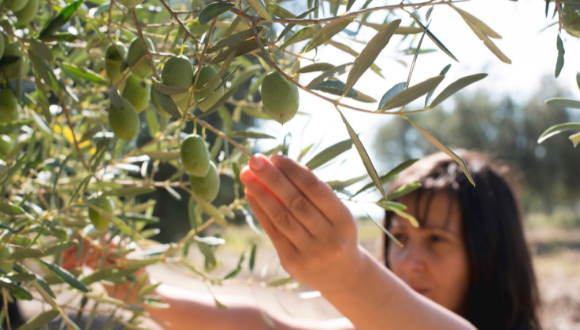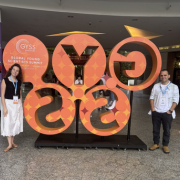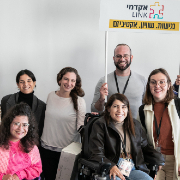Opinion | Language & Conflict in Israel: What Are We Missing?
By Julia Rodbell
Julia Rodbell, Tel Aviv University International TESOL student and TAUi Ambassador, speaks about her newly gained perspective on Israeli language landscapes and their impact on coexistence.
I came to Israel for the TESOL (Teaching English to Speakers of Other Languages) program at Tel Aviv University.I applied to this program for three very simple reasons: I love Tel Aviv, I love teaching, and I love traveling. A TESOL certification enables you to teach anywhere in the world where English is taught as a foreign or second language. Entering the program, I had absolutely no idea how much of an impact the courses would have on me. Not only has my perspective on this country’s conflict changed, my professional goals and aspirations for my future within education have developed.
A fundamental aspect of the tensions in Israel that we largely ignore is language. Israel has a uniquely beautiful and complex history, landscape, and population. But, it is no secret that challenging social dynamics and tensions exist within the country.
One of the first things I learned about in the TESOL program was the organization of the Israeli education system, which is divided into sectors where Arab Israelis, secular Jewish Israelis, and religious Jewish Israelis study separately. This was something I had not given much thought to before, and this structure has major implications for the way that social relations develop between Israelis from a young age.
Students across all of the learning sectors study English. Successfully acquiring English creates greater opportunities for students in Israel. English proficiency impacts access to higher education and career options.
The first issue I see is that English teaching is not equal or equitable as Jewish sector schools have more resources and more native English speaking teachers. Additionally, Jewish students get more exposed to the English language in their daily lives giving them an even greater advantage. Although many of the same English textbooks are used by all sectors, they are largely geared towards the Jewish Israeli perspective and experience which often alienates Arab Israeli students and teachers alike. Arab students must learn Hebrew and English in addition to Arabic, but Jewish students rarely learn Arabic. Arab students become familiar with many aspects of Jewish culture, religion, and language, but this is rarely a two-way occurrence. Interestingly enough, there is evidence that when Jewish students learn Arabic, they develop warmer feelings and more positive attitudes towards Arab people. This is something that should be taken advantage of. Looking at all of these language phenomenons shows a widening achievement gap between Arab Israeli and Jewish Israeli students.
.png)
The other component of the language issue is representation. A course I took in the fall semester of the TESOL program focused on studying the linguistic landscape of Israel. This class completely transformed the way I perceive public spaces in Israel. Hebrew is prioritized everywhere you look, from street names to store signs to actual laws. Arabic is missing from some signage, and when it is included it is often in smaller font, written last, and even misspelled.
English is given special privilege on signage and in education. It makes sense that English holds value as it is an international language in an increasingly globalized society. It also makes sense that Hebrew is highly valued in a Jewish nation that united under this modern adaptation of an ancient language. Hebrew is a symbol of survival for many Jews, a cultural factor that is important to preserve.
But, what does this all say about the standing of Arabic in modern Israel? What message does this lack of representation send to Arabic speakers in the country? What message does this send to the world about how Israel sees and treats Arab Israelis? Language and identity are deeply intertwined, so the marginalization of a language actually has the power to marginalize its speakers.
.png)
We are missing an opportunity here. Israel is missing a chance to leverage the power of language and multilingualism to create a school system and a society that truly values all of its citizens. The TESOL program at Tel Aviv University International opened my eyes to the many nuances of language in Israel, and the solutions that are available. Many of the program’s teachers are already working on this issue. Shared Education is an amazing initiative bringing together Arab and Jewish teachers and students through learning English.
Research is being conducted on the positive impact of multilingual linguistic landscapes on social dynamics and the promotion of social justice. Literature is being dedicated to exposing the lack of representation of Arab culture in Israeli textbooks. Arab and Jewish students deserve the same quality of English instruction. Arab and Jewish Israeli citizens equally deserve to feel represented in the linguistic landscape and by the laws of their home country.
If this conversation about language in the context of conflict in Israel is opened up, the country can develop more inclusive language policy in schools and create a linguistic landscape that reflects that inclusion. Right now, the use of language in schools and public spaces reflects the existing tensions between Arab and Jewish Israelis. What if we worked to have language dynamics reflect what we want social dynamics to look like? What if we embodied a multilingual and multicultural approach to Arabic, Hebrew, and English in the school system and in public spaces, encouraging a more inclusive society? Language has the potential to help heal these divisions, and we should lean into thoughtfully discussing this facet of the conflict.
.png)
Julia and her TESOL class on a recent field trip





